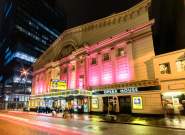Emma Liggins (Manchester Metropolitan University)
 Emma Liggins.jpeg)
To hang out in a café talking about death might seem a morbid or strange thing to do. Yet Death Cafés are now a global phenomenon, enabling conversations about death and dying in a relaxed atmosphere. Originating in the early twenty-first century with the Swiss café mortel, the first UK-based Death Café took place in London in 2011, inspiring others to facilitate their own philosophical discussions in private houses, churches, coffee-shops and community centres. Typically, small groups share tea and cake whilst reflecting on mortality as well as raising questions about loss, funeral practices, supporting family members with terminal illnesses and the afterlife. Those who come along are from different cultural and religious backgrounds, and range in age from their early 20s into their nineties. Rather than just being for the recently bereaved, Death Cafés allow for illuminating conversations about mourning and memorialisation, and what one participant identified as ‘our death-denying culture’ in the UK.
Established in 2016, the Death Café Chorlton has recently revived after Covid restrictions limited public gatherings. Run by Debbie Jones, an independent funeral celebrant, it takes place regularly, around every 6-8 weeks, in Tea Hive, on one of Chorlton’s main streets. With its vintage china, flowers in jam-jars, home-made cakes and old-style ambience, this South Manchester tea-shop might seem an odd setting for a gloomy conversation. But the Death Café movement is built around finding comfortable or quirky spaces to reflect on taboo or difficult topics. Samar Khadrah, one of the owners of Tea Hive, told me that there is a ‘really nice atmosphere’ in the Death Cafés they have hosted, with ‘lots of laughter’ as well as tears. She was proud to ‘create this welcoming environment where you can see strangers opening up’, where people of all religions could talk freely about the ways in which death affected their families and loved ones.
I also spoke to Debbie to find out more about her experiences of hosting the Death Café in Chorlton over the last six years.
Tell us about how you first got involved with co-ordinating the Death Café.
As soon as I heard about the Death Café movement, I knew it was an important and healthy idea, especially for our culture. I held a personal fear of my closest friends and family dying. I had lost my grandparents which was incredibly sad, but no-one else. I was 52 then, in 2016, and felt I was standing on the edge of a precipice, not knowing how I’d cope but knowing for certain that my loved ones would die, and maybe that would start happening soon.
Community is central to me, so to start a Death Café where I live seemed obvious.
So why did you choose Tea Hive?
Largely because when I initially approached Samar and Sam, the owners, they were immediately supportive of the principles and meaning of the Death Café. Plus, it’s cosy, comfortable, friendly and has a fabulous variety of cakes and drinks. It’s also easy to travel to and is well-known.
Why do you think Death Cafés are so important?
Death is such a huge and indisputable part of life, yet we so often don’t know how, when or with whom to talk about it! To know that the Death Café is a place where people gather who are actually wanting to talk about death and dying feels liberating. Here is where we can share our fears, ask our questions, listen to others’ experiences and by doing so, not feel so isolated and scared of such uncertainty. Most of us are hard-wired to want to help people and fix their problems, but we can’t fix this one! We can only listen and be up for a conversation about it.

What surprises you about the conversations you’ve been part of?
How uplifting they can be, with laughter alongside grief and sadness, all in the same evening. There is something extraordinary about being with others who are willing to deeply listen as well as share so openly about their own difficult feelings and experiences. It connects us in a way that can bring a real sense of peace and of feeling settled. A sense of ‘we’re all in this together’.
This sense of connection and peace is definitely something I experienced when coming along to Tea Hive on Death Café evenings. I’ve been moved, enlightened, saddened, and sometimes astonished by the stories shared with me over the flowered tea-cups, and have learnt about Buddhism, Quaker funerals, reincarnation and sky burials. Telling my own stories has helped to process emotions I usually cover up about loss and absent friends. How to commemorate the dead, in eulogies, scattering of ashes, ceremonies or cremations, was a common theme, showing how funeral practices evolve to reflect new ways of thinking about dying and memory-making. Taking turns to speak and listen, in the safe confidential space, was a powerful way to break down taboos, with death and dying emerging as sometimes terrifying or overwhelming but also something to be worked through, ritualised, celebrated, demystified.
As a researcher of Victorian mourning practices and cemeteries, the ritualising and celebration of death fascinates me, not least how it changes through time. Manchester Metropolitan University is partnering with Death Café Chorlton, as part of an AHRC-funded project Celebrations: Victorian and Edwardian Greeting Cards publicising the Laura Seddon collection of over 35,000 cards in our Special Collections Museum. Our workshops set out to engage the local community in collections-based research and to gather a range of views from participants of different ages on card-exchange. At the March Death Café, myself and curator Steph Boydell set out a pop-up display on the oval wooden table by the cake-counter to enable conversations about the iconography of mourning cards, their different designs and messages. We took along copies of a range of cards printed between 1840 and 1920, including traditional Christian memorials of deaths in the family, elaborate memorials of royal deaths with sentimental verses, disaster cards (commemorating losses on the Titanic or in mining accidents) and those designed like bookmarks. This sparked off conversations about modern sympathy cards, and more broadly the best ways to express sympathy in the face of loss.
.jpg)
Laura Seddon Collection, courtesy of Special Collections Museum
If you’d like to come along to future Death Cafés in Chorlton, please contact Debbie Jones on djonescelebrant@gmail.com to be added to the mailing list or join the Facebook group. For those interested in crafting, please come along to our Death Café-Style Evening on Monday 20 June at 6.45 at Tea Hive. This is another chance to see the pop-up display of rare mourning cards from the Seddon collection, and also to produce your own vintage card whilst discussing death. Tickets are available here.







